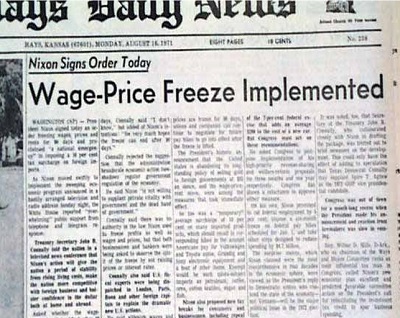
A new paper in Public Choice shows that President Richard Nixon understood the costs of wage and price controls, but implemented them to secure his re-election in 1972. Here is the abstract:
In late July, 1971, Nixon reiterated his adamant opposition to wage and price controls calling them a scheme to socialize America. Yet, less than a month later, in a stunning reversal, he imposed the first and only peacetime wage and price controls in U.S. history. The Nixon tapes, personal tape recordings made during the presidency of Richard Nixon, provide a unique body of evidence to investigate the motivations for Nixon’s stunning reversal. We uncover and report in this paper evidence that Nixon manipulated his New Economic Policy to help secure his reelection victory in 1972. He became convinced that wage and price controls were necessary to grab the headlines away from the defeatist abandonment of the Bretton Woods Agreement and the closing of the U.S. gold window. Nixon understood the impact of his wage and price controls, but chose to trade off longer term economic costs to the economy for his own short-term political gain.
The paper reproduces evidence from the Nixon tapes that reveal the private conversations and motivations behind the implementation of the NEP. Here are a few choice quotes from President Nixon and Treasury Secretary John Connally:
Nixon [February 22, 1971]: ”Here’s my concern about the freeze…There is strong support for a wage board and wage-price controls and particularly from sources like Arthur Burns. … The difficulty with wage-price controls and a wage board as you well know is that the God damned things will not work. They didn’t work even at the end of World War II. They will never work in peacetime.”
Nixon: ”I know the reasons, you do it [wage and price controls] for cosmetic reasons good God! But this is too early for cosmetic reasons.”
Nixon [July 24, 1971] refers to a program proposed by Connally and states that he wants to emphasize ”making America competitive again.”
Connally [July 27, 1971]: ”There is a risk in imposing wage and price controls. No question about it. But there’s a risk if you don’t.”
Connally [August 12, 1971]: ”To the average person in this country this wage and price freeze–to him means you mean business. You’re gonna stop this inflation. You’re gonna try to get control of this economy. …If you take all of these actions…you’re not going to have anybody…left out to be critical of you.”
A few minutes later Nixon agrees to accelerate the [NEP] program.
While Nixon was initially reluctant to accept the wage and price freeze, he soon turned into an enthusiastic supporter: ”As a matter of fact, I’d like the freeze on right through the election.” He worried that the goal of a 2-3 % inflation rate by the end of 1972 would not be achieved, but the design for the program was such that Nixon could plausibly deny responsibility for any failure.
The paper clearly shows that it was political motives of re-election that drove Nixon’s decision to implement policy that was known to be extremely costly to the economy. File this one under the explanatory power of public choice. Self-interest is often a powerful motive for political actors (for more, see Bruce Bueno do Mesquita’s EconTalk on a revisionist perspective of US presidencies).
An ungated version of the paper is available here.

READER COMMENTS
Andrew_FL
Dec 19 2016 at 8:49pm
Nixon was always a moderate/progressive Republican, not a principled conservative, so it isn’t terribly surprising he would go with the politically expedient.
What’s more interesting is Nixon citing Arthur Burns as pushing this policy specifically. Relevant to recent attempts to resuscitate the reputation of one of our worst Fed Chairs by inflationists.
Jim Rose
Dec 19 2016 at 9:23pm
Not Read the actual paper but does this is not imply that they had to listen through countless hours of tapes to find the key information or that someone else that already done that for them?
Roger Sweeny
Dec 20 2016 at 9:44am
There is a wonderful story in Pat Buchanan’s memoir of the 1968 campaign, The Greatest Comeback. Alan Greenspan had written a speech for Nixon, calling for a more free market agriculture policy. The speech was leaked and several Republican senators from farm states were very, very annoyed. Nixon asked Buchanan to write a different speech, which actually called for an increase in subsidies. Buchanan personally delivered the speech to one of the senators, who was very, very pleased. Nixon was then very pleased.
After recounting the story, Buchanan repeats something Nixon had previously told him, “You have to have principles, but you also have to be pragmatic.”
Thaomas
Dec 20 2016 at 11:07am
Somehow or other Liberal policy preferences keep getting blamed for this!
SaveyourSelf
Dec 21 2016 at 9:24am
Donald Rumsfeld mentioned this in his biography, Known and Unknown: A Memoir. It’s been a couple of years since I read it, but if I recall correctly, Rumsfeld recounts that Nixon asked him to run the Office of Economic Opportunity in 1969. Rumsfeld said he told Nixon that he was exactly the wrong man for that job because he despised the concept of price controls on many levels. Nixon told him that was precisely the reason he wanted him in charge. He didn’t want the price controls to last. He wanted someone in charge who was sure to dismantle them with prejudice once the election was secured. Rumsfeld took the job because he thought, even if he refused, Nixon would get someone else to do it and that someone else might not destroy the system of price controls properly when Nixon deemed they had accomplished their purpose.
Joni Abrams
Dec 24 2016 at 11:08am
Jim Rose: my brother co-wrote the paper and, yes, he listened to hours and hours of the Nixon tapes.
Comments are closed.